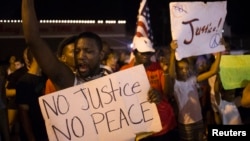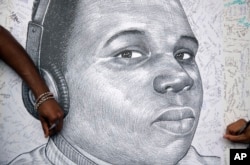After three consecutive nights of relative calm in the Missouri suburb of Ferguson, where a white policeman fatally shot an unarmed black teenager nearly two weeks ago, it appears tensions between protesters and the police are waning.
On Friday, Missouri Governor Jay Nixon ordered the state National Guard to withdraw, and there have been no reports of clashes during daily demonstrations sparked by the killing of 18-year-old Michael Brown. But the apparent easing of tensions hasn’t silenced debate about the deep racial divide that Brown's death thrust into the international spotlight.
To some observers, the incident and surrounding controversy over the so-called "militarization" of Ferguson's police department and its heavy-handed tactics towards African-Americans, come as no surprise. Population shifts in American communities over the past two decades created the kind of smoldering racial tensions that erupted in Missouri, said Sam Fulwood III, a senior fellow at the Center for American Progress.
"What had been going on in Ferguson as well as in many, many, many other communities all across the country is demographic change, which has been uneven and has been perceived, particularly by people of color in those communities as disadvantageous to them," Fulwood said during an appearance on VOA's Encounter program. "That has bred a long sense of grievance and frustration and anger that is often most exhibited by interactions between youth and police."
And so as Ferguson – a community of 21,000 – slowly morphed from majority white to majority black, those who held power remain the same.
"In 1980, 80 percent of the population in Ferguson was white. In 2010, the population was 85 percent black. So you can see the dramatic changing," Fulwood said. As Ferguson became ever more populated by communities of color, it also became poorer because, Fulwood said, it lost its economic base.
Suburbanization in the United States has historically been defined by whites moving from cities and their poor, minority communities, taking their economic dominance with them – so-called "white flight." But that narrative no longer applies.
"We've seen a reversal across the country in recent years – across the country, not just in Ferguson in St. Louis – of the suburbs becoming increasing black and minority populations, communities of color. But they've become poorer," Fulwood said.
And that trend plays out in local politics, leading to situations like Ferguson, where the vast majority of elected officials are white in the majority black community, argues Anthony E. Cook, a law professor at Georgetown University, who also appeared on Encounter.
"When you look at the practices with regard to disenfranchisement, you see common practices throughout the nation," he said. "A lot of the local elections are not held during election year in November, they are held in April, in off months when voter turnout is going to be very difficult anyway."
Cook said voter turnout in the past few elections in Ferguson has been as low as two to five- percent, and those kinds of electoral barriers show that racism, while not enshrined into American law, has nonetheless become institutionalized.
"You're not using race-specific classifications or strategies...no one may be having laws that say no blacks can vote or no blacks can be employed on the school board, but yet the very process by which you have structured the voting system and the means of selecting officers results in disproportionate number of blacks being excluded from the process, and marginalized in that process," he said.
From there, both Fulwood and Cook said it's not hard to connect the dots and see how a Ferguson shooting can happen.
Out of the tragedy of Brown's killing, Cook said, there lies a rare opportunity for Americans
"We have the possibility here of creating a multi-cultural, multi-racial, multi-ideological bi-partisan approach to dealing with this problem. I see Libertarians that are upset with the militarization of the police force...I see Liberals that are upset that you've got a situation where black minority poor communities are being disproportionately impacted by this brutality," he said.
"This may be an opportunity to raise that to a level of national discourse."






